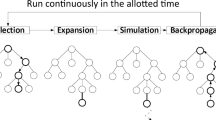Abstract
Mainstream explanations to gambling specify conditions under which human agents are locally risk loving. Such theories, however, fail to explain the typically observed prize distribution of a few large prizes and a large number of medium ones—hence the medium prizes paradox. In the current study we show that adaptive learning models recently proposed in the literature offer a solution. Simulations of such models predict that multiple medium prizes will slow down the decrease (over time) in agents' inclination to gamble. We run a laboratory experiment that supports this explanation and shows that the positive effect of medium prizes on the inclination to gamble increases with time.
Similar content being viewed by others
References
Bereby-Meyer, Y. and I. Erev. (1998). “On Learning To Become a Successful Loser: A Comparison of Alternative Abstractions of Learning Processes in the Loss Domain,” Journal of Mathematical Psychology 42, 266–286.
Borgers, T. and R. Sarin. (1997). “Naive reinforcement learning with endogenous aspirations,” mimeo. University College London and Texas A&M University.
Brandts, J. and C. Holt. (1996). “Naive Bayesian Learning and Adjustment to Equilibrium in Signaling Games,” working paper, University of Virginia.
Bush, R. R. and Mosteller, F. (1955). Stochastic Models for Learning, Wiley, New York.
Camerer, C. and T. Ho. (1999). “Experience Weighted Attraction Learning in Normal Form Games,” Econometrica 67, 827–874.
Carbone, E. and J. D. Hey. (1994). “Discriminating Between Preference Functionals—A Preliminary Monte Carlo Study,” Journal of Risk and Uncertainty 8, 223–242.
Carbone, E. and J. D. Hey. (2000). “Which Error Story is Best?,” Journal of Risk and Uncertainty 20, 161–176.
Cheung, Y. and D. Friedman. (1997). “Individual Learning in Normal Form Games: Some Laboratory Results,” Games and Economic Behavior 19, 46–76.
Christiansen, E. M. (1998). “Gambling and the American Economy,” Annals of the American Academy of Political and Social Science 556, 36–52.
Clotfelter, C. T. and P. J. Cook. (1989). “The Demand for Lottery Products,” National Bureau of Economic Research Working Paper 2928.
Crawford, V. (1995). “Adaptive Dynamics in Coordination Games,” Econometrica 63, 103–144.
Devereux, E. C. (1968). “Gambling.” In David L. Sills (ed.), International Encyclopedia of the Social Sciences. New York: The Macmillan Company and the Free Press.
Erev, I., Y. Bereby-Meyer, and A. Roth. (1999). “The Effect of Adding a Constant to All Payoffs: Experimental Investigation, and Implications for Reinforcement Learning Models,” Journal of Economic Behavior and Organization 39, 111–128.
Erev, I. and A. Roth. (1998). “Predicting How People Play Games: Reinforcement Learning in Experimental Games with Unique Mixed Strategy Equilibria,” American Economic Review 88, 848–881.
Friedman, M. and L. J. Savage. (1948). “The Utility Analysis of Choice Involving Risk,” Journal of Political Economy 56, 279–304.
Fudenberg, D. and D. K. Levine. (1998). The Theory of Learning in Games. Cambridge, MA: MIT Press.
Machina, M. (1982). “Expected Utility Analysis Without the Independence Axiom,” Econometrica 50, 277–323.
Ng, Y. K. (1975). “Why Do People Buy Lottery Tickets? Choice Involving Risk and the Indivisibility of Expenditure,” Journal of Political Economy 73, 530–535.
Quiggin, J. (1991). “On the Optimal Design of Lotteries,” Economica 58, 1–16.
Robson, A. (1996). “The Evolution of Attitudes to Risk: Lottery Tickets and Relative Wealth,” Games and Economic Behavior 14, 190–207.
Roth, A. and I. Erev. (1995). “Learning in Extensive Form Games: Experimental Data and Simple Dynamic Models in the Intermediate Term,” Games and Economic Behavior 8, 164–212.
Sadler, M. (2000). “Escaping Poverty: Risk-Taking and Endogenous Inequality in a Model of Equilibrium Growth,” Review of Economic Dynamics, 3, 704–725.
Sarin, R. and F. Vahid. (2001). “Predicting How People Play Games: A Simple Dynamic Model of Choice,” Games and Economic Behavior, 34, 104–122.
Skinner, B. F. (1953). Science and Human Behavior. New York: The Free Press.
Stahl, D. (1996). “Boundedly Rational Rule Learning in a Guessing Game,” Games and Economic Behavior 16, 303–330.
Tang, F.-F. (1996). “Anticipatory Learning in Two-Person Games: An Experimental Study,” Discussion paper B-363, University of Bonn.
Tversky, A. and D. Kahneman. (1992). “Advances in Prospect Theory: Cumulative Representation of Uncertainty,” Journal of Risk and Uncertainty 5, 297–323.
Van Huyck, J., J. Cook, and R. Battalio. (1997). “Adaptive Behavior and Coordination Failure,” Journal of Economic Behavior and Organization 32, 483–503.
Viscusi, W. K. (1989). “Prospective Reference Theory: Towards and Explanation of the Paradoxes,” Journal of Risk and Uncertainty 2, 235–263.
Wakker, P., I. Erev, and E. Weber. (1994). “Comonotonic Independence: The Critical Test Between Classical and Rank-Dependent Utility Theories,” Journal of Risk and Uncertainty 9, 195–230.
Author information
Authors and Affiliations
Rights and permissions
About this article
Cite this article
Haruvy, E., Erev, I. & Sonsino, D. The Medium Prizes Paradox: Evidence From a Simulated Casino. Journal of Risk and Uncertainty 22, 251–261 (2001). https://doi.org/10.1023/A:1011183001837
Issue Date:
DOI: https://doi.org/10.1023/A:1011183001837




